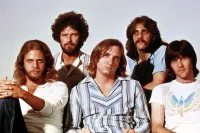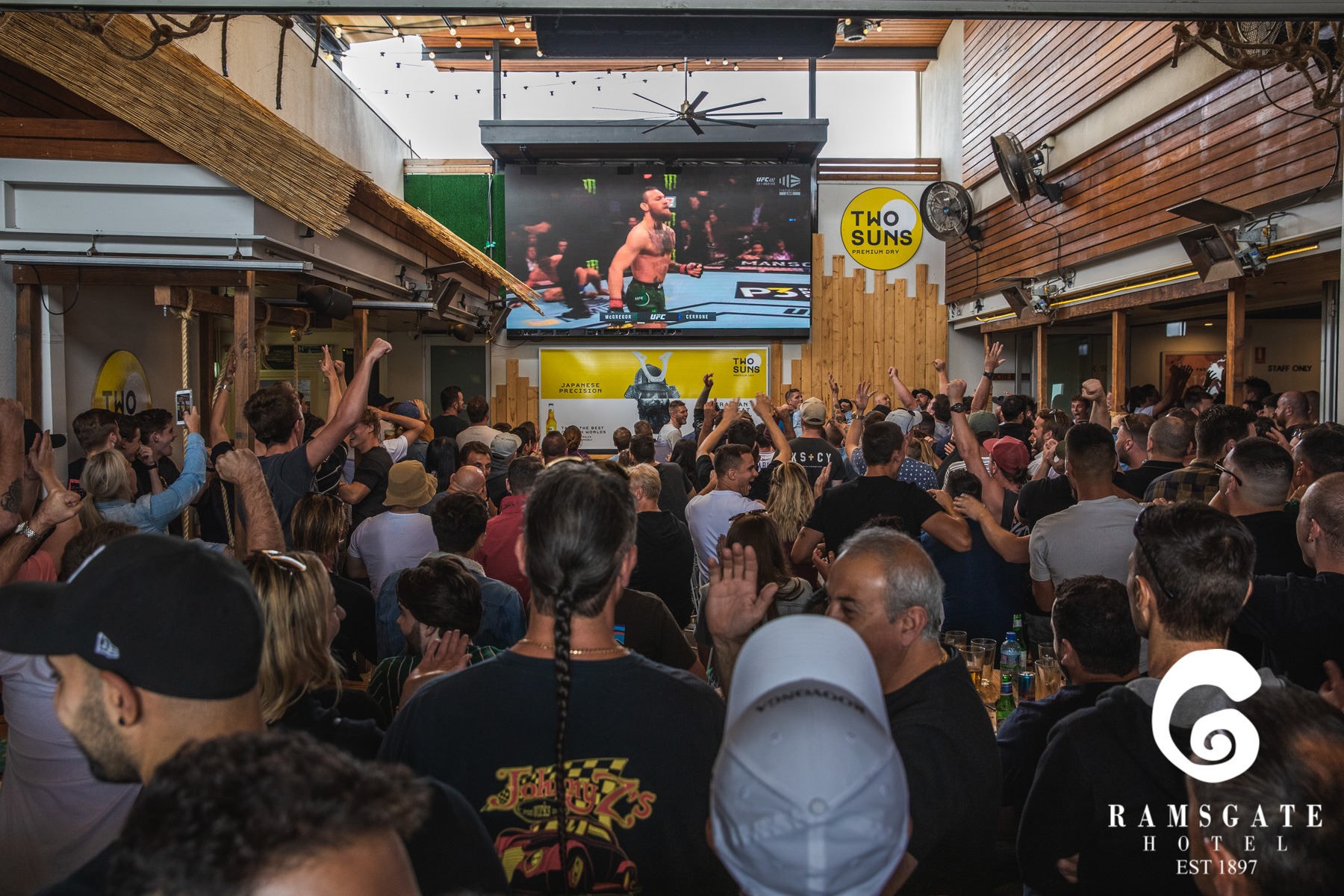
Nostalgic, laidback and cruisy – what’s not to love about the Eagles’ astonishing back catalogue?
Before forming Eagles, the band’s all-singing founding members – guitarist Glenn Frey, drummer Don Henley, guitarist Bernie Leadon and bassist Randy Meisner – were Linda Ronstadt’s musos of choice: Frey and Henley toured as part of Ronstadt’s backing band, and all four dudes played on her self-titled third solo album. After signing with David Geffen’s new label, Asylum Records, Eagles enjoyed immediate success with 1972’s eponymous debut album, going on to build one helluva majestic career resume: five #1 singles, six #1 albums, six Grammys and five American Music Awards.
Although Frey and Henley were the primary Eagles songwriters, Leadon and Felder also chipped in on occasion, and the band’s tunes make a perfect soundtrack for coastal road trips, caravan holidays or sipping cocktails by the pool. Read on to discover why we reckon the below five Eagles songs are of particularly importance within their expansive discography.
Witchy Woman (1972)
Written by: Don Henley and Bernie Leadon
The story goes that Leadon started writing Witchy Woman while he was a member of The Flying Burrito Brothers, before bringing it to Henley for his input. Released as the second single from the Eagles’ self-titled debut album, Witchy Woman – which is more about a seductress than an actual sorceress – is one of the first songs Henley ever wrote (it’s also his only songwriting credit on the band’s first record), which you’ve gotta admit it pretty bloody special.
Desperado (1973)
Written by: Glenn Frey and Don Henley
Desperado was built from a song idea Henley had been tinkering with since the late-‘60s and completed, with Frey’s help, shortly after Eagles returned from recording their debut album in England. In the liner notes for The Very Best Of The Eagles, Henley recalled: “Glenn came over to write one day, and I showed him this unfinished tune that I had been holding for so many years. I said, ‘When I play it and sing it, I think of Ray Charles – Ray Charles and Stephen Foster. It’s really a Southern gothic thing, but we can easily make it more Western.’ Glenn leapt right on it – filled in the blanks and brought structure. And that was the beginning of our songwriting partnership – that’s when we became a team.”
Henley has said the “big orchestra” that was recruited for the Desperado recording session made him extremely nervous. “Some older gentleman had brought chessboards and they would play between takes,” he told Mojo in 2015. “I would hear these remarks like, ‘Well, you know, I don’t feel much like a desperado.’ I was so intimidated that I didn’t sing my best. Our producer Glyn Johns, who is still a friend of mine, I think, wanted to get the album done quickly and economically, and he didn’t let me do many takes. I wish I could have done that song again.”
Desperado was the first song Frey and Henley wrote together, and then they went on to co-write Tequila Sunrise that same week – what a dream team! It’s also the last song Frey performed in concert with the Eagles since the band closed out the final date of their History Of The Eagles tour with Desperado in 2015. Frey passed about six months later.
Did you know? Linda Ronstadt recorded a version of this song, which appears on her 1973 album Don’t Cry Now, released just six months after Eagles’ Desperado album.
One of These Nights (1975)
Written by: Don Henley and Glenn Frey
Felder’s bendy, distorted guitar solo elevates this sneaky l’il number to another level. And Meisner’s high harmonies during refrains (“Oooooooooooo, someone to be kind to in between the dark and the light…”) are simply irresistible as well. If you get Bee Gees vibes while listening to this one, you’re not alone: Eagles shared a studio with Bee Gees and the “four-on-the-floor” bass-drum pattern was a nod to disco, according to Henley.
“We wanted to get away from the ballad syndrome with One Of These Nights,” Henley told Rolling Stone around the time of this song’s release. “With Don Felder in the band now, we can really rock.”
In The Very Best Of compilation’s liner notes, Frey singled out One Of These Nights as his favourite Eagles song.
Hotel California (1977)
Written by: Don Felder, Glenn Frey and Don Henley
The band reportedly spent a whopping eight months in the studio finessing Hotel California, with Henley telling Rolling Stone: “We just locked ourselves in. We had a refrigerator, a ping pong table, roller skates and a couple cots. We would go in and stay for two or three days at a time.”
That opening shimmering riff is so immediately recognisable – hopeful, with a sinister undertone and a knowing wink. During interviews, the Eagles seem openly bored by the constant misinterpretations and inquiries about this song. When a journo posited “everyone wants to know what this song means” during a 60 Minutes interview, Henley replied, “I know, it’s so boring. It’s a song about the dark underbelly of the American Dream, and about excess in America, which was something we knew about.”
In 2013’s History Of The Eagles doco, he changed his tune: “It’s a song about a journey from innocence to experience.”
Although many misinterpreted the lyrical phrase “Warm smell of colitas” as a reference to weed or something sexual, Felder, who joined Eagles in 1974, has revealed, “The colitas is a plant that grows in the desert that blooms at night, and it has this kind of pungent, almost funky smell.”
The line, “They stab it with their steely knives but they just can’t kill the beast,” sees Eagles exercising their right of reply after Steely Dan – with whom they shared a manager (Irving Azoff) – referenced the band within their 1976 song, Everything You Did: “Turn up the Eagles, the neighbours are listening”. Apparently Walter Becker’s girlfriend had the Eagles on high rotation, which drove the Steely Dan co-founder nuts.
At six-and-a-half minutes’ duration, Hotel California challenged the AM radio-hit formula, which favoured songs with running times between three and three-and-a-half minutes. Radio stations also preferred songs with brief intros so that the announcer didn’t have to bang on for too long before the vocals kicked in. But Hotel California’s intro goes for a whole minute and this classic song also contains a ripper, textured two-minute guitar solo, which Felder and Joe Walsh played together.
Hotel California won the Record Of The Year Grammy in 1977, but the band was not in attendance to accept the award. Apparently they watched the ceremony on TV while rehearsing, because Timothy B. Schmit had just joined the band (replacing Randy Meisner) and needed to be brought up to speed with their repertoire.
Fun fact: Hotel California utilises similar chord progressions to Jethro Tull’s song Used To Know (from 1969’s Stand Up album). Eagles toured with Jethro Tull prior to Hotel California’s release, but Jethro Tull’s Ian Anderson remains good-natured about the likeness, admitting during an interview, “I do sometimes allude, in a joking way, to accepting it as a kind of tribute.”
It’s Your World Now (2007)
Written by: Glenn Frey and Jack Tempchin
Eagles posted this song’s lyrics alongside the announcement of Frey’s death in 2016. And following his bandmate’s passing, Henley observed this song was Frey’s “beautiful valediction to his wife and kids”.
Long Road Out Of Eden peaked at #1 on the US charts, where it sold 7 million copies, and set a new benchmark for the longest time between chart-topping albums for any recording artist (1979’s The Long Run, Eagles’ previous studio album, had topped the charts 28 years prior). Long Road Out Of Eden was also the band’s first album release since Felder was kicked out of the band in 2001 following financial disputes.


